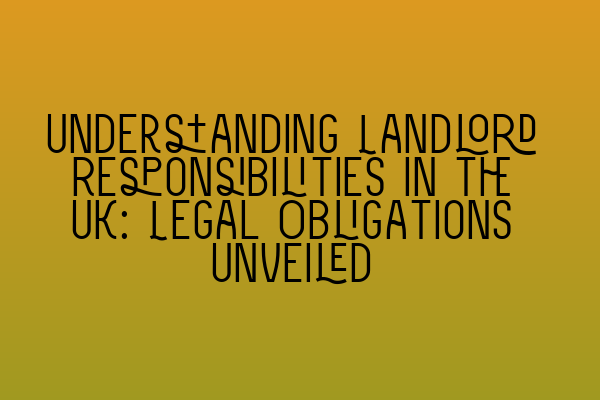Understanding Landlord Responsibilities in the UK: Legal Obligations Unveiled
If you are a landlord in the UK, it is crucial to have a comprehensive understanding of your legal responsibilities. Landlord responsibilities are not just about collecting rent; they extend to ensuring the safety and well-being of your tenants, maintaining the property, and complying with various laws and regulations. In this blog post, we will delve into the key landlord responsibilities in the UK and shed light on the legal obligations that come with being a landlord.
1. Safety and Compliance
One of the primary responsibilities of a landlord is to ensure the safety of their tenants. This includes providing a property that is free from hazards and complies with all relevant health and safety regulations. It is crucial to conduct regular inspections to identify any potential hazards and address them promptly. Additionally, landlords must ensure that all necessary safety equipment, such as smoke and carbon monoxide detectors, are installed and properly maintained.
To ensure compliance with safety regulations, landlords should familiarize themselves with the Housing Health and Safety Rating System (HHSRS). The HHSRS assesses potential risks in a rental property and provides guidance on how to rectify them. It covers various factors, such as fire safety, electrical hazards, dampness, and more.
2. Repairs and Maintenance
Landlords are responsible for maintaining the property in a good state of repair. This includes addressing any necessary repairs promptly and adequately. Landlords should address issues such as plumbing problems, electrical faults, heating or air conditioning issues, and structural defects. Regular inspections can help identify any maintenance issues that need attention.
It is important to note that tenants have the right to live in a property that is fit for habitation. The Fitness for Human Habitation Act 2018 sets out the minimum standards for rental properties, ensuring they are safe, healthy, and free from hazards. Landlords must ensure that their property meets these standards, and failure to do so could result in legal action by the tenant.
3. Tenancy Agreements and Legal Documentation
Every tenancy must have a written tenancy agreement in place. This document outlines the rights and responsibilities of both the landlord and tenant. The agreement should cover key aspects such as rent amount, payment terms, tenancy duration, and any specific rules or restrictions. A well-drafted tenancy agreement can help avoid disputes and ensure clarity between both parties.
Landlords should also provide tenants with relevant legal documents, such as the government’s How to Rent guide and an up-to-date Gas Safety Certificate. These documents not only fulfill legal obligations but also inform and protect the tenant.
4. Deposit Protection
In the UK, landlords are legally required to protect their tenants’ deposits in a government-approved deposit protection scheme (DPS). This helps ensure that the deposit is returned to the tenant at the end of the tenancy or used appropriately for any damages or unpaid rent. Landlords must provide tenants with details of the scheme within 30 days of receiving the deposit.
5. Eviction and Rent Arrears
While it is essential to establish good relationships with tenants, it is also crucial to be prepared for situations where eviction or rent arrears may become an issue. Landlords must follow the correct legal procedures when seeking to evict a tenant or recover rent arrears. This includes issuing proper notices, following the correct timelines, and, in some cases, seeking possession orders from the court.
To protect your rights as a landlord and ensure a smooth eviction process, it is recommended to seek legal advice from a qualified property law solicitor. They can guide you through the process and ensure you are acting within the bounds of the law.
In conclusion, being a landlord in the UK comes with a range of legal responsibilities. It is essential to understand and fulfill these obligations to ensure the safety and well-being of your tenants, maintain your property, and avoid legal pitfalls. By staying up-to-date with the relevant laws and regulations, landlords can protect their interests and provide a positive renting experience for their tenants.
If you are preparing for the SQE exams or looking for SQE exam dates or preparation courses, check out our related articles:
– SQE 1 Practice Exam Questions
– SQE 1 Practice Mocks FLK1 FLK2
– SQE 2 Preparation Courses
– SQE 1 Preparation Courses
– SRA SQE Exam Dates
Disclaimer: The information provided in this article is for general informational purposes only and does not constitute legal advice. For specific advice regarding your situation, consult with a qualified property law solicitor.
